Dentures — Friendswood, TX
Complete Your Smile After Advanced Tooth Loss
 After tooth loss, replacement is essential. Partial and complete dentures allow for proper chewing and speaking, and they also improve your oral health by providing necessary support for the jaw bone. If you have lost several teeth or a full arch in the top or bottom jaw, full and partial dentures dentures in Friendswood, TX can come to the rescue.
After tooth loss, replacement is essential. Partial and complete dentures allow for proper chewing and speaking, and they also improve your oral health by providing necessary support for the jaw bone. If you have lost several teeth or a full arch in the top or bottom jaw, full and partial dentures dentures in Friendswood, TX can come to the rescue.
Who’s a Good Candidate for Dentures?

One of the great things about dentures is that they work for almost anyone! If you are missing multiple, most of, or all of your teeth, chances are that you are a good candidate for dentures. During your consultation with us, we will determine whether or not you are eligible for the treatment. Depending on the number and location of missing teeth, a customized plan will be made just for you. If you have any preexisting oral health conditions, like tooth decay or gum disease, these will need to be addressed ahead of time. When it comes to restoring your smile, your dental health is our number one priority!
Effects of Missing Teeth

According to the American College of Prosthodontists, the most common causes of missing teeth include tooth decay, gum disease, and trauma. After losing teeth, you can experience a variety of negative consequences, like facial sagging, difficulty speaking, trouble eating, and a reduction in your self-esteem. This can all have an impact on confidence and quality of life.
What Qualifies You for Dentures?

Dentures are an excellent option for patients who have experienced significant tooth loss and have sensitive and/or decayed teeth but have sufficient healthy gum tissue and jawbone. It’s also important that denture wearers are committed to maintaining an excellent oral hygiene routine and can care for their dentures properly.
The number of teeth you are missing will ultimately determine which type of denture is right for you. One of the great things about dentures is that they are more affordable than other tooth-replacement options, making them ideal for patients who are unable to invest lots of money into their smile at this time.
Alternative Tooth-Replacement Options
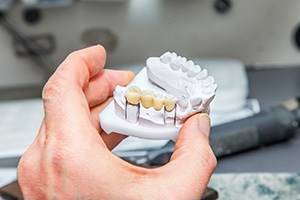
Patients who aren’t a good candidate or don’t want to get dentures may be a good candidate for a couple of other tooth replacement options:
- Dental Bridges: Dental bridges are ideal for patients who are only missing one or a few teeth. They require healthy teeth surrounding the missing tooth to support the restoration.
- Dental Implants: Dental implants are surgically inserted into the jawbone, so patients must have a solid bone structure. This option is more costly than traditional dentures, but it’s meant to be permanent.
Partial Dentures Fill In the Gaps
 When you are dealing with several missing teeth, either all in a row or from different parts of the mouth, a partial denture provides a natural-looking, sturdy replacement. This method is used when one or more healthy natural teeth still remain in the gum line. Carefully crafted to match the size, shape, and color of the rest of your smile, the partial denture is attached to the natural teeth with metal clips and brackets.
When you are dealing with several missing teeth, either all in a row or from different parts of the mouth, a partial denture provides a natural-looking, sturdy replacement. This method is used when one or more healthy natural teeth still remain in the gum line. Carefully crafted to match the size, shape, and color of the rest of your smile, the partial denture is attached to the natural teeth with metal clips and brackets.
Complete Dentures Replace a Whole Arch
 For people who have already lost all of their teeth, or who are on the brink of total tooth loss, a full (or complete) denture provides the support the jawbone needs. Prosthetic teeth attached to a base that looks just like your gum tissue, the complete dentures are retained in the mouth using natural suction. Small amounts of a denture adhesive can provide extra support as needed.
For people who have already lost all of their teeth, or who are on the brink of total tooth loss, a full (or complete) denture provides the support the jawbone needs. Prosthetic teeth attached to a base that looks just like your gum tissue, the complete dentures are retained in the mouth using natural suction. Small amounts of a denture adhesive can provide extra support as needed.
Dentures can also be held in place by traditional dental implants or with the All-on-4 method. Implant dentistry offers the best combination for tooth replacement.
Dental Implant Retained Dentures: A Comprehensive Solution
 Dental implants provide a prosthetic root for the tooth replacement. The best option in replacement, they provide truly unsurpassed stability. The dental implant is a small titanium post that acts as a prosthetic root for the tooth that is affixed to the top. Titanium is a material that fuses with bone matter in a process we call osseointegration. It takes six to eight months to complete, but once it has finished, your dental implants are as secure as any other bone in your body.
Dental implants provide a prosthetic root for the tooth replacement. The best option in replacement, they provide truly unsurpassed stability. The dental implant is a small titanium post that acts as a prosthetic root for the tooth that is affixed to the top. Titanium is a material that fuses with bone matter in a process we call osseointegration. It takes six to eight months to complete, but once it has finished, your dental implants are as secure as any other bone in your body.
A dental implant can be used to replace a single missing tooth, several lost teeth, or a whole row from the top or bottom of the mouth. For the latter, All-on-4 provides an effective solution.
As the name suggests, All-on-4 supports all the replacement teeth on just four dental implants. It relies on strategic placement for maximum support from the jawbone. By eliminating the need for bone augmentation procedures, All-on-4 gives patients who are not a candidate for traditional dental implants the chance to enjoy the security provided by implant dentistry.
The benefits of All-on-4 for patients who have lost all of their teeth are numerous. They include…
- Teeth are loaded in the same day
- Fewer implants means All-on-4 is less expensive than the traditional method
- Eat, speak, and smile with renewed confidence
- Eliminates the need for preparatory bone augmentation procedures
The Benefits of Dentures

Adult tooth loss can make everyday living a bit harder. After all, it turns eating, speaking, and even smiling into chores instead of pleasures. Still, you can count on dentures to fix such things. They dramatically raise your quality of life! As proof, we at Friendswood Dental have listed the benefits of dentures in Friendswood below. Please read them over to see how prosthetic teeth are truly transformative. Otherwise, call our office or book a visit to learn more!
Psychological Benefits

As you may know, being without teeth is often hard to accept. The situation can create feelings of anxiety, anger, and frustration. Plus, smile gaps can breed insecurity that triggers sadness and depression. From there, you might feel tempted to retreat from social activities.
Luckily, dentures solve these mental and emotional issues. By restoring your appearance, they grant you increased confidence and self-esteem. The prosthetics also reduce anxiety about speaking and chewing ability. As a result, you feel calmer, happier, and more willing to chat with friends or family.
Clearer Enunciation

It’s harder to speak when you lack teeth. Your lips and tongue, you see, need pearly whites to position themselves. You’ll struggle to say words clearly if they can’t do that.
Dentures, of course, act as replacement teeth. They thus help you to enunciate more clearly while speaking. All you need is a short adjustment period to get used to them. Once you’ve had time to practice, you can talk normally!
Improves Nutrition

If you’re missing teeth, your diet will likely suffer. For better or worse, many nutritious foods – veggies, fruits, healthy proteins – are tough in texture. When you lack teeth, then, you’ll struggle to eat such things. Consequently, you could suffer problems like indigestion and malnutrition.
With the power of dentures, though, this scenario can change. They can improve your ability to chew, allowing for a more expansive diet of healthy foods. You’d then receive the essential vitamins and minerals for optimal health.
Preserves Oral Health

Leaving smile gaps untreated isn’t good for your oral health. The spaces serve as breeding grounds for germs, which raise your risk of tooth decay and gum disease. At the same time, these gaps can cause crooked smiles by tilting your surrounding teeth.
It’s a good thing, then, that dentures fill in your smile. In doing so, they deprive bacteria of places to thrive and keep your pearly whites from shifting. Often, they even take pressure off of natural teeth and so prevent excessive enamel loss.
Expands Opportunities

Your smile is one of the first things people notice, so others will recognize if you’re missing teeth. Should that happen, they might have a worse impression of you and respond accordingly. You’d face problems with friends, family, or coworkers in that case.
However, dentures complete and restore your smile. They can therefore help the world see you more positively. These better impressions would lead to great opportunities in your personal and professional lives.
Understanding the Cost of Dentures

Your financial situation should never stand in the way of a complete smile. Various factors affect the cost of dentures in Friendswood, but we strive to keep them affordable for everyone. You won’t have to compromise quality or aesthetics to stay within your budget. We offer the high-quality dentures you need that won’t cost you an arm or a leg.
Factors That Affect the Cost of Dentures

There is no one-size-fits-all denture because every mouth is as unique as your fingerprints. Therefore, the amount you’ll pay is determined by your individual treatment plan. After examining your mouth and learning more about your goals, your denture dentist in Friendswood will create a personalized strategy to rebuild your smile. Although every situation differs, you can expect your estimate to include:
- Preliminary Treatments: It’s common to need some prep work, like tooth extractions or gum disease therapy.
- Type of Denture: Based on your preferences and the number of teeth you’re missing, you have multiple options to choose from.
- Number of Arches: Treating both arches will cost more, but you can’t just have teeth on the top or bottom.
- Materials: Discounted materials may not be as comfortable, durable, or aesthetically pleasing. We’ll help you choose the best materials for your investment.
Are Implant Dentures More Expensive?

Implant dentures can be more expensive initially, but they are the most affordable long-term because you’ll never need replacements. Not to mention, they improve your oral health to avoid costly treatments later. Since it takes several phases to complete the procedure, you won’t have to worry about coming up with a large sum. Instead, you can pay for each step in your treatment, making it easier to budget for your new smile. In some cases, you can even use your dental insurance to lower the cost.
Does Dental Insurance Cover Dentures?

Most dental plans consider dentures as a major service, which means they’ll cover about 50% of the cost after meeting your deductible. You can also use your insurance to offset the cost of other steps in your treatment, like the consultation, gum disease therapy, or tooth extractions. A member of our team will work on your behalf with your dental insurance to maximize your benefits. They’ll explain how your coverage is being used and if you owe any remaining balance.
Other Options for Making Dentures Affordable

Dentures in Friendswood don’t have to break the bank. Our office offers the solutions you need to replace your pearly whites without spending your life’s savings. Besides using your dental insurance, we accept multiple payment methods, including:
- Traditional Payments: Our office accepts all traditional payment options, including cash, checks, and credit cards.
- Monthly Payments: Pay any out-of-pocket expenses using monthly payments with little or no interest through a third-party financing company, like CareCredit.
Don’t let the cost of dentures stop you from enjoying a beautiful, functional smile. We have the solutions you need to treat your missing teeth, even if money is tight. Contact our office today to request your consultation.
Dentures Aftercare

After receiving your dentures, you should still plan on visiting your dentist once every six months for checkups and cleanings. Any remaining teeth could still be at risk for cavities, and of course, there’s always the chance of gum disease developing if you aren’t practicing good oral hygiene. It’s essential to have these types of problems caught early for the sake of your oral health.
As for the dentures themselves, if you want to keep them for as long as you can before you need to have them replaced, then you need to think carefully about the kind of care that you’re giving them every day.
Removable Dentures
Remove After Eating
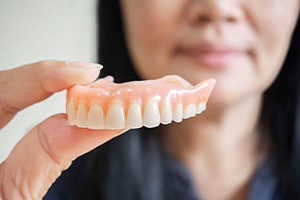
You may feel like sitting back and relaxing after a delicious meal, but before you do, take your dentures out and run them under some water first. (Make sure that the water isn’t too hot; most modern dentures are made of acrylic, which warps easily when exposed to heat.) When you rinse your dentures, you stop food and harmful bacteria from building up, which is important for preventing the development of gum disease.
Clean Your Restoration
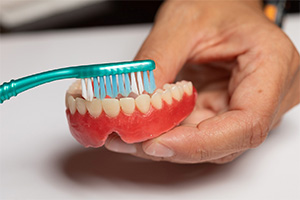
It’s important to be aware of the best practices for cleaning your dentures. Always take them out of your mouth first, and remember to only brush them with a soft-bristled toothbrush. Instead of toothpaste, use a specialized denture cleanser or something non-abrasive like unscented hand soap.
You don’t want to get any cleaning products in your mouth, so always rinse your dentures when you’re getting ready to wear them again.
Keep Your Dentures Safe

As durable as dentures are, it’s all too easy for them to break. When you take them out, don’t risk dropping them on the floor or the bathroom cabinet; place a towel underneath you to catch your dentures if you happen to let them fall by mistake.
When storing dentures, make sure they’re kept moist. Also, don’t put them anywhere where a pet or a small child might be able to get to them.
Remove Dentures When You Sleep
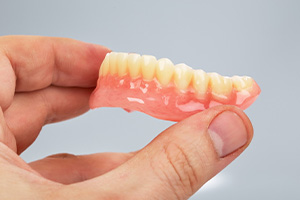
It’s not good for your gums to wear your dentures 24 hours a day; you need to give them a chance to rest to avoid irritation of your soft tissues. In the evening, take your dentures out and put them in a safe container filled with denture-soaking solution.
Notice Changes

Have you noticed sores under your dentures lately? Have any of your prosthetic teeth become cracked? Are your dentures moving around when they shouldn’t or making a clicking noise? If you notice these or any other unusual developments, call our office right away for guidance.
All-on-4 Dentures
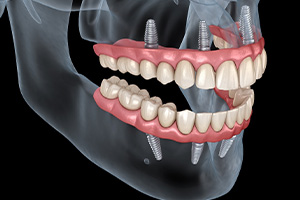
Caring for All-on-4 dentures is different since they’re permanently anchored in your mouth like real teeth. You should brush your dentures at least two times every day with toothpaste that doesn’t contain abrasive ingredients. Flossing is also important; if you’re having trouble cleaning underneath your prosthesis, use a floss threader or switch to a water flosser. Plaque and tartar may start building up in any areas you have a hard time brushing or flossing, so be sure to use mouthwash as well.
Denture FAQs

Dentures in Friendswood have been used for generations to treat tooth loss. Although they are tried and proven, it’s normal to have a few apprehensions before you are ready to commit to them. Don’t worry, we will address any concerns during your denture consultation. In the meantime, here are the answers to the most frequently asked questions.
Can I sleep with my dentures?
Initially, your dentist will instruct you to wear your new dentures for 24 hours, but then you will need to get in the habit of taking them out before going to bed. No one wants to be caught without their teeth, but your mouth is the perfect breeding ground for harmful bacteria that can affect your oral health and general wellness. Not to mention, it can weaken your denture over time, shortening its lifespan and leading to unpleasant odors. Your dentures will also restrict circulation to your gums, which can lead to sores, inflammation, and infections if the tissue isn’t given time to rest. Removing your dentures before calling it a night allows your gums to receive the nutrients they need while also allowing you to clean them well to keep your mouth and body healthy. You will also keep ordos at bay and ensure you get the most from your investment.
Do dentures always cover the upper palate?
Dentures are available in many styles. If you aren’t comfortable with an upper denture covering the palate, you have many options to choose from. Your denture dentist in Friendswood will review each method that may be right for you, like one with a horseshoe shape. It looks like a denture used for the lower arch or along with dental implants, so you won’t have to worry about it covering the roof of your mouth or diminishing the way food tastes.
Do I use regular toothpaste to clean my dentures?
Your dentures will mimic your natural teeth, but they can’t be cleaned the same way. Abrasive dental products can scratch the surfaces of your dentures, which can tarnish their appearance. In addition, food particles, plaque, and bacteria can get trapped in the crevasses, damaging your denture and causing odors. Instead, it is better to use a soft-bristled toothbrush and mild hand soap or dishwashing liquid. Besides brushing your dentures, soak them in an overnight soaking solution to kill any bacteria left behind by your toothbrush.
Can I eat steak with dentures?
It is entirely possible to eat steak with dentures; however, your dentist will advise you to have it in moderation. Foods that require a lot of chewing will put more wear and tear on your new teeth. It can also cause sores and inflammation of the gum tissue. If you can’t resist a juicy steak, cut it into small pieces to make it easier to chew. Consider using a denture adhesive for added stability when enjoying your favorite meal. If you want to eliminate slipping and irritation for good, ask your dentist about adding the support of dental implants.
Let’s Discuss Your Dentures Today!
If you are missing several or a whole row of teeth, don’t put off tooth replacement for another day. Full, partial, and All-on-4 dentures provide the stability your jaw needs. Contact your dentist in Friendswood, TX to get started! You may also request your appointment conveniently online.

 Checkups
Checkups Dental
Dental 3-on-6™
3-on-6™ Cerec® Same-Day
Cerec® Same-Day Full Mouth
Full Mouth Invisalign®
Invisalign® Cosmetic
Cosmetic Sedation
Sedation